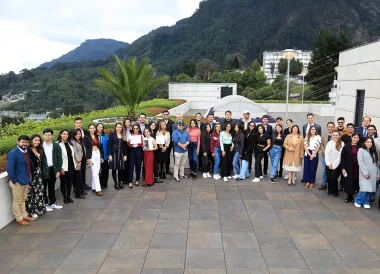Uncategorized
25 de marzo de 2020
Dispute System Design as a key element for a successful digital company

In the Formula One Series, performance depends on how close the teams may be to perfection. Mechanical engineering and the aerodynamic structural design are taken to the limit. Along with seamless driving, in order for a team to get enough points to win the championship, each one of the races that make up the season has to be up to par. A single loose screw could hamper the chances of scoring more points.
This same thing applies for the light speed pace of e-commerce with customers expected to have spent last year roughly USD$ 3.46 trillion, which represents an increase of 17.9% compared to the 2018 worldwide consumption.[1] If traditional companies want to be a part of this market, then they will have be able to adapt themselves to collaborative economy, offering an excellent client service and a smooth conflict resolution system.[2]
Having to participate in more transactions, sometimes means that businesses have a raise in the number of disputes to be handled; for example eBay around 60 million, whereas Alibaba´s handles hundreds of millions of disputes annually.[3] This is why having a quick and fair dispute system in place is critical for any company looking for global outreach, otherwise the trust of those clients who are mercilessly thrown to vent their dissatisfaction before slow and mostly overwhelmed national justice systems will be forever lost
Given the huge amounts of disputes, it would be extremely expensive for companies to create a legal department just dedicated to handle disagreements generated by national or cross-border trade. This is why the industry has turned to technology, creating and improving speedy dispute systems, which try to make sure that nobody is going to take advantage of others, covering all angles of those who are part of the procedure.
Amazon, for example, uses algorithms to decide rapidly what to do with a customer who claims having received a wrong or faulty product[4]; whereas eBay´s online resolution center, after diagnosing the root of the conflict, helps the parties to settle differences by themselves through automated negotiations and if that is not possible, then mediation and arbitration comes into play[5]. For its part, Alibaba has such a good online dispute resolution system that the Chinese government requested its support in order to design a network of virtual courts in China.[6]
By relying on technology to solve disputes, companies also reduce expenses related to conflict management and this serve as a way to discourage bad-faith returns, which is taking a big bite out of retailers valued around fifteen billion dollars per year.[7]
So when executives asses the effectiveness of the dispute resolution systems applied by their companies on a cost-benefit basis, they should not take into account only the money invested in running such platforms, but also how the procedures are perceived by the parties and the market, in other words, if the process and methods are considered fair.[8]

Stanford Law Students are quite privileged for being part of a unique symbiosis with Silicon Valley and for having “Dispute System Design” within their portfolio of classes, taught by professors Janet Martinez and Colin Rule, two worldwide known experts on the subject. The later has been recruited to be part of the group of international lecturers of the brand new Diploma in Legal Innovation offered by the University Externado of Colombia.
Along their lectures, professors Martinez and Rule apply an analytic framework (including stakeholder assessment and conflict resolution process options) to a series of case studies and use simulations to understand different kinds of dispute systems, while also examining the growing use of online dispute resolution (ODR) and algorithmic approaches in dispute system design. There is a review of the development of ODR and the new challenges it poses to neutrals and system designers, and state-of-the-art ODR technologies are tried out, while highlighting best practices for the use of technology in this matter. This knowledge and training offer law students the essential wherewithal to advise digital enterprises on the best ways to avoid or overcome conflicts nowadays.
*Luis Alfonso Gomez
International business lawyer, graduated of the University Externado of Colombia Law School (JD equivalent). Master in International Business and Management from the University of Westminster in London, course in Successful Negotiation Strategies, University of Cambridge, after which worked as part of Motorola´s legal team in the United Kingdom. Negotiation Research and Teaching certificate offered by the Dispute Resolution Research Center at Northwestern University, Chicago.
Currently, associate lawyer at Rincón-Cuellar law firm, mediator at the Chamber of Commerce of Bogotá and research lecturer at the Business Law Department, University Externado of Colombia, teaching negotiation strategy, among other subjects; and member of the Committee of Commercial Practices ICC. Author of the book: International Negotiation – Strategic Approach. Tilburg University´s PhD candidate, research subject: artificial intelligence applied to dispute system design.
[1] https://www.digitalcommerce360.com/article/global-ecommerce-sales/. Consulted 02/01/2020.
[2] Schmitz, A. and Rule, C. The new handshake. Online Dispute Resolution and the Future of Consumer Protection. Amarican Bar Asoociation. Chicago. 2017. Pag. 51.
[3] Katsh, E. and Rabinovich-Einy, O. Digital Justice. Technology and the Internet of Disputes. Oxford University Press. Oxford. 2017. Pág. 15.
[4] Katsh, E. and Rabinovich-Einy, O. Digital Justice. Technology and the Internet of Disputes. Oxford University Press. Oxford. 2017. Pág. 48.
[5] https://20160dr.wordpress.com/2016/04/14/odr-platforms-ebay-resolution-center/. Consulted 02/10/2020.
[6] https://www.merics.org/en/blog/size-matters-alibaba-shapes-chinas-first-court-internet. Consulted 02/11/2020.
[7] Van Loo, Rory, The Corporation as Courthouse (November 18, 2016). Yale Journal on Regulation, Vol. 33, No. 547, 2016; Boston Univ. School of Law, Public Law Research Paper No. 16-48. Available at SSRN: https://ssrn.com/abstract=2872096
[8] Constantino, C. and Merchant, C. Designing conflict management systems. A guide to Creating Productive and Healthy Organizations. Jossey-Bass. San Francisco. 1996. Pág. 10.
Artículos Recientes
¡Ya está disponible el caso! Segunda versión del Concurso Laboratorio de Estrategia Legal #LSL
Invitamos a los estudiantes de pregrado y postgrado de todas las carreras a presentar [...]
Masterclass Legal Operations: Transformando la Función Legal Empresarial de Guardián de Riesgos a Creador de Valor.
El Departamento de Derecho de los Negocios y la Facultad de Administración de Empresas [...]
Conclusión del Proceso de Reforma al Investor-State Dispute Settlement
En la semana del 12 de julio de 2023, durante la sesión anual de [...]
El Departamento de Derecho de los Negocios de la Universidad Externado de Colombia abre convocatoria para la vacante de Asistente de Investigación
¡Sé parte de nuestro equipo de trabajo! Perfil del cargo: Asistente de Investigación Apoyar [...]
Docente del Departamento de Derecho de los Negocios participó en el libro Blanco de la Asociación de Derecho Internacional
La Asociación de Derecho Internacional (ADI), una de la organizaciones más antiguas y prestigiosas [...]
CRYPTO IN COLOMBIA: PROSPECTIVE 2022
By: Daniel Peña Valenzuela The volatility of the main cryptocurrencies seems to be once [...]
Convocatoria de Monitores.
El Departamento de Derecho de los Negocios se complace en anunciar la apertura para [...]
¿Se avecina una regulación de la Franquicia por parte del Gobierno? ¿O lo impedirá la Corte Constitucional?
Por: Juan Miguel Álvarez* y Diana Marcela Araujo* En diciembre del 2020, el congreso [...]
Solución a Controversias Comerciales vía Mediación: Algunas reflexiones en torno a la convención de Singapur
El pasado 12 de marzo de 2025, se realizó el Foro de Solución a [...]
Especialización en Innovación Legal
Este programa se caracteriza por presentar un contenido de avanzada, visionario frente a las [...]
Especialización en Contratación Internacional
Sumérgete en un programa innovador y exclusivo en Colombia que te brinda una preparación [...]
Especialización en Derecho de los Negocios
Con más de 26 años de tradición en el mercado, es el único programa [...]


















